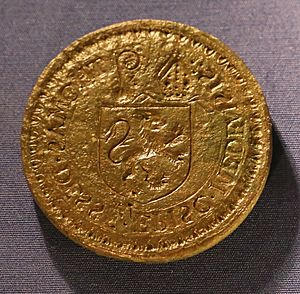Thomas Dease facts for kids
Thomas Dease was a significant figure in Irish history. He served as the Roman Catholic Bishop of Meath during a challenging time for Catholics in Ireland.
The Life of Thomas Dease
Thomas Dease was born in Ireland in 1568. He passed away in Galway in 1651. His family was an old Irish one, and they once owned a lot of land in County Cavan and County Westmeath.
Early Life and Education
When he was young, Thomas learned to speak the Irish language very well. He even wrote some poems in Irish. He decided he wanted to become a priest. To do this, he traveled to Paris, France. After he was ordained as a priest, he spent his first few years there. During this time, he became the head of the Irish College in Paris, which was a school for Irish students.
Becoming a Bishop
In 1621, Thomas Dease returned to Ireland. He had been chosen to become the Bishop of Meath. Another person named Thomas Messingham took over his role as the head of the Irish College in Paris. Thomas Dease officially became a bishop the following year, in 1622.
Challenges and Loyalty
Even though there were difficult laws against Catholics at the time, Thomas Dease remained loyal to the English government. He encouraged the people in his area to also be loyal. He did not agree with a group called the Confederation of Kilkenny, which was a Catholic alliance formed during the Irish Confederate Wars. He refused to join them, even when other religious leaders tried to convince him.
Because of his loyalty, the government treated him with some tolerance. However, this made him unpopular with many of his fellow Catholic countrymen. It especially annoyed the Pope's representative, known as the nuncio, Giovanni Battista Rinuccini. The nuncio even accused Bishop Dease of causing disagreements between two important Irish generals, Thomas Preston and Owen Roe O'Neill.
In 1648, the nuncio heard that Dease had died and was not sad about it. But the news turned out to be false! The nuncio then wrote to Rome, saying that the bishop was still alive and continued to "test the patience of good people." Thomas Dease lived for a few more years after this, passing away in 1651.
 | Georgia Louise Harris Brown |
 | Julian Abele |
 | Norma Merrick Sklarek |
 | William Sidney Pittman |


